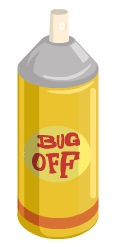Mosquito Prevention and Protection
Always Remember The 3 D's Of Protection From Mosquitoes
Drain
Many mosquito problems in your neighborhood are likely to come from water-filled containers that you, the resident, can help to eliminate. All mosquitoes require water in which to breed. Be sure to drain any standing water around your house.
- Dispose of any tires. Tires can breed thousands of mosquitoes.
- Drill holes in the bottom of recycling containers.
- Clear roof gutters of debris.
- Clean pet water dishes regularly.
- Check and empty children’s toys.
- Repair leaky outdoor faucets.
- Change the water in bird baths at least once a week.
- Canoes and other boats should be turned over.
- Avoid water collecting on pool covers.
- Empty water collected in tarps around the yard or on woodpiles.
- Even the smallest of containers that can collect water can breed
hundreds to thousands of mosquitoes. They don’t need much water
to lay their eggs. (bottles, barrels, buckets, overturned garbage can
lids, etc.)
Dress
Wear light colored, loose fitting clothing. Studies have shown that some of the 174 mosquito species in the United States are more attracted to dark clothing and most can readily bite through tight-fitting clothing of loose weave. When practical, wear long sleeves and pants.
Defend
 Choose a mosquito repellent that has been registered by the Environmental Protection Agency. Registered products have been reviewed, approved, and pose minimal risk for human safety when used according to label directions. Four repellents that are approved and recommended are:
Choose a mosquito repellent that has been registered by the Environmental Protection Agency. Registered products have been reviewed, approved, and pose minimal risk for human safety when used according to label directions. Four repellents that are approved and recommended are:
- DEET (N,N-diethyl-m-toluamide)
- Picaridin (KBR 3023)
- Oil of lemon eucalyptus (p-methane 3,8-diol, or PMD)
- IR3535
Here are some rules to follow when using repellents:
- Read the directions on the label carefully before applying.
- Apply repellent sparingly, only to exposed skin (not on clothing).
- Keep repellents away from eyes, nostrils and lips: do not inhale or ingest repellents or get them into the eyes.
- The American Academy of Pediatrics (AAP) suggests that DEET-based repellents can be used on children as young as two months of age. Generally, the AAP recommends concentrations of 10% or less, unless disease risk is imminent, then concentration can be increased to 30% or less.
- Avoid applying repellents to portions of children’s hands that are likely to have contact with eyes or mouth.
- Repellents can be used by pregnant or nursing women. The EPA does not recommend any additional precautions for repellent use by pregnant or nursing women.
- Never use repellents on wounds or irritated skin.
- Use repellent sparingly and reapply as needed. Saturation does not increase efficacy.
- Wash repellent-treated skin after coming indoors.
- If a suspected reaction to insect repellents occurs, wash treated skin, and call a physician. Take the repellent container to the physician.
Information Courtesy Of: 